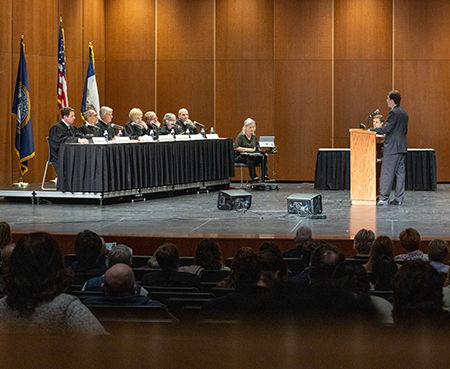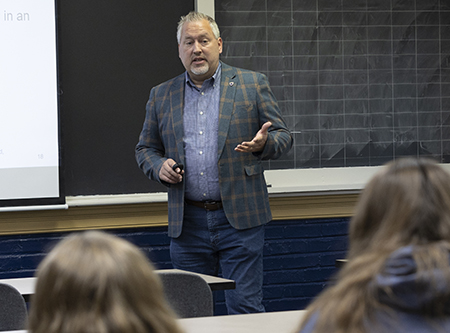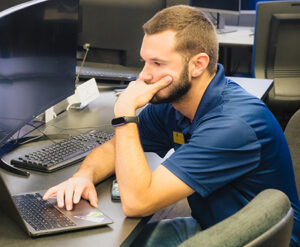A closer look at three safety-focused programs preparing Graceland graduates to serve and protect their communities and critical systems.
July 22, 2025 | Jennifer Smith

Eric Williams ’27 appreciated Chief Justice Christensen’s explanation of the various steps involved in an appellate court session.
In April, under heightened security and safety measures, current and prospective Criminal Justice and Forensic Psychology students witnessed the Iowa Supreme Court at work on the Lamoni campus. This insight into a complex legal process and demonstration of all the people and parts involved was also a once-in-a-lifetime opportunity for everyone from the Graceland and Lamoni communities who attended the special session.
From the auditorium seats in the Shaw Center or via livestream from the stage-turned-courtroom, the public observers intently followed the oral arguments that were part of the Court’s proceedings in Case No. 24-0346, Kelly Brodie, et al. v. Iowa Department of Health and Human Services, et al.
In an oral arguments session, the attorneys deliver presentations to the court to emphasize specific legal aspects. The appellant (party who filed the appeal) speaks first, then the appellee (opposing party). The appellant returns a brief rebuttal or reply argument. During oral arguments, the Supreme Court further directly queries attorneys to help clarify case nuances and ruling implications.
Following the hearing, everyone was invited to a reception sponsored by the District 5B Bar Association. Students, faculty, and community members were able to meet in facie curiae, face-to-face with the Supreme Court — and now be the ones to pose their questions to the justices: Chief Justice Susan L. Christensen, Justice Matthew McDermott, Justice Christopher McDonald, Justice Edward M. Mansfield, Justice David May, Justice Dana Oxley, and Justice Thomas D. Waterman.

Alissa Caruso ’27 had a chance to chat with Justice Matthew McDermott at the reception held after the session.
Assistant Professor of Criminal Justice Matt Schneider, MS, appreciates the exemplary learning opportunity this campus court session provided. His students majoring in Criminal Justice and Forensic Psychology like Alissa Caruso ’27, Clemente Delgado ’27, Breeanna Greer ’26, and Eric Williams ’27, took away a lot from this highly educational session. Explanations throughout the proceeding helped them understand the greater context and significance of the hearing. They found surprising aspects and moments, were fascinated with the argumentation dynamics between the justices and the attorneys to maintain their lines of reasoning, and were impressed by the preparation, precision, commitment, and eloquence of the presenting parties.
“My personal takeaway is a better understanding of an appellate court and how it works. It was a great experience to witness a proceeding in session, and to be able to talk to the justices afterwards.”
ALISSA CARUSO ’27
Criminal Justice & Forensic Psychology major
Criminal Justice graduates help make the world safer by: preventing and deterring crime, enforcing law, and assuring accountability.
When Schneider arrived in academia, he didn’t give up what his police badge signifies to him — he simply found a place of honor to display it: in his office in Briggs Hall. Here, his rich experience in active and administrative law enforcement and his passion for teaching converge. He had just rounded off a fulfilled and accomplished police career with a master’s degree when he started at Graceland in the fall of 2022, and initially thought he was taking up an adjunct teaching position, but found himself in it to build it — and that’s what he’s been doing ever since. He cleaned up the Criminal Justice program catalogue, redesigned the curriculum, and — as a tactile learner himself — placed hands-on learning at its core. By keeping it real with “any chance we get in the classroom to get up and out of our seats,” as he says, he ensures that his students graduate not only as professionals, but leaders and innovators in the field of criminal justice.
Hands-on learning in the classroom ensures students graduate not only as professionals, but leaders and innovators in their field.

Matt Schneider lectures on the juvenile court and waivers of jurisdiction during his Criminal Justice class in Briggs Hall.
His most popular class is Criminal Investigation with its weekly labs that simulate authentic crime scene settings. Students assume the role of detectives and identify, collect, analyze, and interpret even the tiniest traces of evidence. Of course, some fundamental courses such as constitutional law and law history remain highly academic in nature and may require some “sitting through” at times, but Schneider supplements concepts that initially seem abstract with real-life cases, a critical look and respectful debate to bring their practical application to life. He wants to make sure that students receive a well-rounded, solid foundation from which they can embark on several professional paths — and provide them with the space for exploration at Graceland they need to be sure that it’s the right one for them.
Immense pride shines through in Schneider for every single one of “his” students who goes on to a law enforcement academy, law school, or officer training school. He just extended a tradition from his active-duty days to his recent graduates and had challenge coins made for them as a token of recognition, stewardship, and camaraderie. With his students’ continued success in mind, he, too, has accepted a challenge: to push ahead with the expansion of the Criminal Justice program. Schneider will be adding courses and knowledgeable colleagues to teach them, such as alumna Lisa Hynden-Jeanes, JD, ’98 who brings in her valuable Iowa Assistant Attorney General perspective. He is also intensifying outreach activities with professional associations for research and publication opportunities, and organizations and initiatives such as the Iowa Cold Case Unit for internship, practicum, and summer job placements. He further plans to introduce some of the most sophisticated tech tools that are used in the field today, such as drones — along with the required FAA licensing to give students a considerable head start as their law enforcement career takes flight.
Forensic Psychology graduates help make the world safer by: understanding criminal behavior, improving judicial policies and practices, and providing consultation, advocacy, and training at the intersection of psychology and law.
Last fall, Graceland became one of only a few schools in the nation to introduce a residential undergraduate Forensic Psychology program [read more about this program in the Horizons Spring 2024 issue]. Incoming freshmen as well as current students double-majoring in Criminal Justice and Psychology benefited from the new offering — and formed “a very bright class,” as Associate Professor of Psychology Nancy King, PhD, profiles the program’s first cohort.
In a unique arrangement, King and Schneider kicked off the program as an interdisciplinary dream team, teaching the inaugural Introduction to Forensic Psychology class in tandem and blending their knowledge at the complex intersection of their respective expertise. Schneider contributes the law and legal, and King the psychology perspective, creating a classroom dynamic that inspires the two of them just as much as it enriches the classroom experience for everyone.
The program places high academic standards on Graceland students: they must maintain a GPA of 3.5 in their coursework. King keeps a strict eye on this figure to ensure that graduates are set for success in the highly demanding but equally rewarding professional environments their degree in Forensic Psychology will lead them to.
The personal glimpse that the visiting Iowa Supreme Court judges allowed into their decisive work at the highest judicial level perfectly tied into the coursework that also surveys landmark rulings. Students examine their historical significance, the legal precedents and policy implications they set, and dive into questions of principles, norms, and ethics.
CSIT Cyber & Homeland Security graduates help make the world safer by: protecting critical infrastructure and essential services, identifying data vulnerabilities, and keeping systems secure by shielding, immunizing, and patching them against cyber threats.

A student focuses on his work in the CSIT lab in Resch Science & Technology Hall.
When Arup Ghosh, PhD, speaks about basic hygiene, disinfection, immunization, viruses, and patches, one could easily assume his doctorate in a medical field. However, he speaks as the Math and Computer Science Department Chair and Assistant Professor of Computer Science — who can’t wait to fill the classes for three new concentrations within the Computer Science & Information Technology major.
Practice-oriented and plugged into a powerful network of industry connections and tech partnerships, the three tracks AI & Data Science, Software & Web Development, and Cyber & Homeland Security are sure to incubate a promising smart bunch of graduates. Ghosh is particularly excited about the Cyber & Homeland Security concentration that covers digital infrastructure and literacy, cyber terrorism and defense, digital forensics, ethical hacking, and penetration testing. To be truly career ready, students can opt in to acquire industry-aligned qualifications as part of their coursework — equipping them with a powerful combination of university degree and practical competencies. Currently, these are the Google Cybersecurity Certificate, Cisco Certified CyberOps Associate, or a CompTIA Security+, CEH (Certified Ethical Hacker), (ISC)² CC (Certified in Cybersecurity), and CISSP (Certified Information Systems Security Professional) certifications.
With the infinite number of possibilities and ways to approach risk assessment and mitigation in the cyber sphere, a “normal” physical three-dimensional classroom setting is not to be expected. In one crucial exercise, students simulate an attacker/defender scenario: “Only if you know how to exploit the system, you understand how to adequately defend it, so before we can teach how to protect a system, we need to teach how to hack it,” Ghosh explains. He looks forward to learning a lot in the process himself, from his students: “Each day will be an opportunity for our students to come up with a novel idea that no one had ever thought of before.”
We can’t wait to see those fresh approaches develop on the Lamoni campus in the fall!
Academics - Spring / Summer 2025
July 22, 2025
Graceland has always been a place where potential takes root, where students are invited to discover their purpose and are given the tools to pursue it with confidence. That tradition continues this fall as Graceland proudly launches two new academic programs on the Lamoni campus: a Master of Business Administration (MBA) and a Bachelor of Science in Nursing (BSN).
Academics - Spring / Summer 2025
July 22, 2025
When Barbara Pitchford ’73 Voshall, DNP, RN, began her journey at Graceland, she likely never imagined the profound influence she would have on the field of nursing education.
Academics - Spring / Summer 2025
July 22, 2025
Allied Health major and track runner Grace Testerman ’26 has many sides: the athletic, the creative, and the caring side. She’s happiest where she can be all three, and for her senior capstone project, she found a place that turned out to be just right.